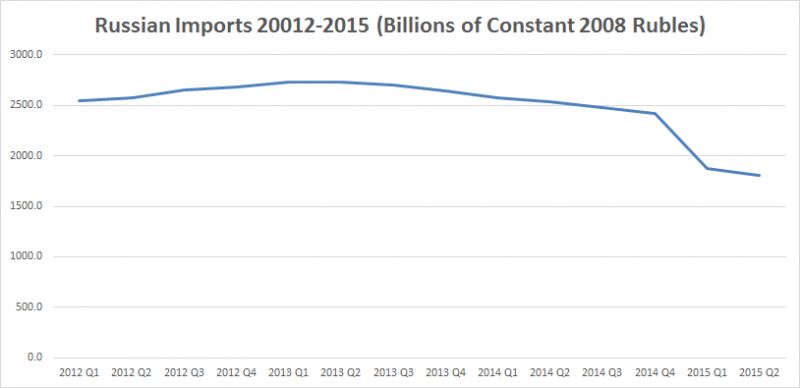Ever since the West slapped sanctions on Russia’s economy in the aftermath of the annexation of Crimea and the barely-disguised intervention in Eastern Ukraine, the Kremlin, and the large number of Kremlin friendly media outlets, have struck a bold and defiant tone.
According to the Kremlin’s (obviously self-interested) interpretation, European and American sanctions would backfire. Instead of harming Russian business, they would actually give domestic entrepreneurs a chance to seize market share. The Kremlin even dusted off a nearly forgotten term from the annals of development economics (“import substitution”) to describe what would take place. Basically, Western sanctions, along with a healthy depreciation of the ruble, would be a good thing because they would spark domestic industry.
How’s that working out so far? Not very well! As the ruble has swooned, crippling the purchasing power of Russian households, imports really have declined. Here, from Rosstat, is what has happened to inflation-adjusted imports over the past several years:
From the second quarter of 2014 through the second quarter of 2015, the ruble value of Russia’s imports decreased by almost 30% (the ruble value of exports, meanwhile, actually increased). That’s actually not terribly surprising. When a currency depreciates as much as the ruble has over the past year you would expect imports to take a significant hit.
But what has happened to domestic manufacturing? Has Russian business stepped into the space vacated by Western goods that are no longer affordable to many Russian consumers?
So far, at least, the answer is a definite no. Official Rosstat data show that through the first half of 2015, Russian manufacturing actually shrunk by about 2.8%. The only sectors of the economy to show any growth were agriculture (up 2.4%), natural resource extraction (up 2.4%), and public administration (up 0.7%). The areas of the Russian economy where private business predominates, particularly consumer retail, have been absolutely walloped, with the overall retail sector shrinking by almost 9% over the past six months.
So far, then, the crisis has not made Russia’s economy any more flexible, entrepreneurial, or dynamic. It has instead made it even more dependent on the old growth model, which was based on government and natural resources. One of the few areas of agreement in Russian society is that the old model is exhausted and in desperate need of replacement, but exactly the opposite is occurring right now: it is being further bolstered and institutionalized. Russian business isn’t rushing to fill the space left by Western firms, it’s suffering amid a broad-based downturn in virtually all areas outside of oil, gas, and government.
Some very intelligent people saw this coming a long way off, accurately predicting that heightened tensions with America and the European Union would empower precisely those areas of the Russian economy that the West wants to see weakened.
The dynamics outlined above aren’t going to play out indefinitely. At some point, the ruble’s devaluation will spark a resurgence in industrial production. But it seems obvious that Russia’s economy is suffering genuine pain, and that the government’s optimistic delusions about “import substitution” have not been born out in reality. Much deeper and more painful reforms, reforms that will hit the pocketbooks of a lot of politically-connected insiders, are necessary before Russia can take advantage of its newly-cheap currency.
No Russia’s economy is not ”imploding,” but its performance to date suggests that its most deep-seated problems, particularly weak property rights and a general aversion to investment, have not been ameliorated, much less resolved. The Kremlin can pretend this isn’t the case, of course, but reality has other ideas.
Mark Adomanis — I specialize in Russian economics and demographics.
Forbes: Как не работает российское импортозамещение
После того, как из-за аннексии Крыма и едва замаскированной интервенции в Восточной Украине западные страны ввели санкции в отношении России, Кремль и все прокремлевские СМИ, решили нанести ответный удар.
Москва заявила, что европейские и американские санкции несут неприятные последствия исключительно самому же Западу. Вместо того, чтобы вредить российскому бизнесу, они, фактически, дают отечественным предпринимателям возможность занять освободившуюся долю рынка. Кремль даже вытащил из анналов экономической науки почти забытый термин «импортозамещение», чтобы описать то, как это будет происходить. Западные санкции, наряду со здоровой, по их словам, девальвацией рубля, в итоге, пойдут экономике только на пользу, поскольку дадут толчок развитию отечественной промышленности.
Но как это скажется на отдаленном будущем? Совсем не хорошо! После того, как рубль обвалился, существенно подорвав покупательскую способность российских семей, импорт действительно сократился. Ниже приведены данные Росстата, которые показывают, что случилось с импортом за несколько последних лет:
Со второго квартала 2014 года по второй квартал 2015 года, стоимость рубля упала почти на 30% (в то же время в рублевой стоимости российский экспорт на самом деле вырос). Это не так уж и удивительно. Когда валюта обесценивается настолько, насколько за последний год обесценился рубль, вполне ожидаемо, в первую очередь страдает импорт.
Что же случилось с отечественным производством? Занял ли российский бизнес рыночный простор, свободный теперь от западных товаров, которые стали недоступными большинству российских потребителей?
Ответ — точно нет. По крайней мере, пока. Официальные данные Росстата показывают, что в первой половине 2015 года, российское производство фактически сократилось на 2,8%. Немногими секторами экономики, в которых наблюдался какой-либо рост, стали сельское хозяйство (2,4%), добыча природных ресурсов ( 2,4%) и государственное управление (до 0,7%). Секторы российской экономики, где преобладает приватный бизнес, в частности, розничная торговля, подверглись серьезному удару. В целом, сектор розничной торговли за последние шесть месяцев сократился почти на 9%.
На сегодняшний день кризис не принес в российскую экономику больше гибкости, предпринимательства или динамики. Напротив, он сделал ее еще более зависимой от прежней модели роста, основанной на государственной власти и природных ресурсах. Почти все российское общество согласно с тем, что старая модель исчерпана и отчаянно требует замены, но прямо сейчас все делается с точностью, до наоборот. Российский бизнес не торопится заполнить пространство, покинутое западными фирмами, он страдает на фоне спада практически во всех сферах за пределами нефти, газа, и бюрократического аппарата.


